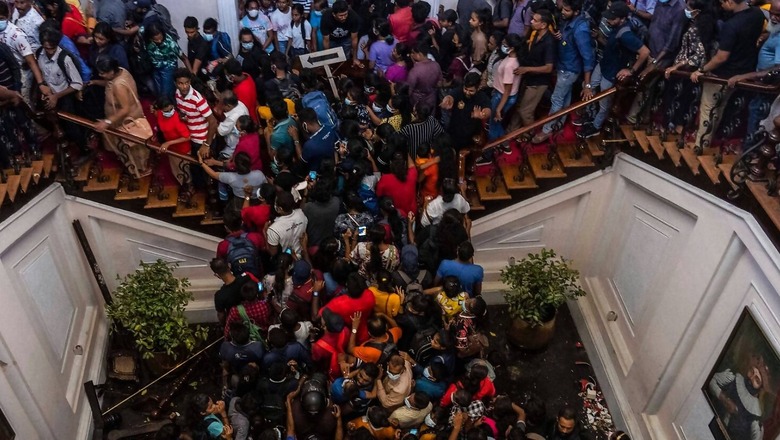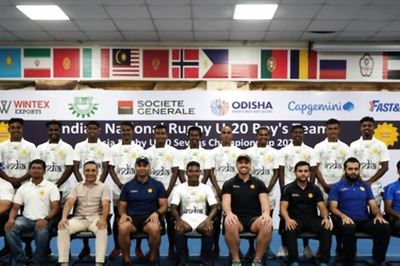
views
There are conflicting reports on whether Sri Lanka’s beleaguered President Gotabaya Rajapaksa has fled the country or not, but there is no denying that the island nation is facing massive fuel, food and medical shortages. The country has run out of fuel and electricity generation is scarce, which is why for a major part of the day, power remains absent from Sri Lankan houses. Protein has become extinct from the diet of ordinary Sri Lankans, impacting babies and children the most. Plain rice and coconuts are the most the Sri Lankans are barely being able to afford to ensure their survival.
The nation’s forex reserves have diminished radically, with just about $2 billion remaining. As per former Prime Minister Ranil Wickremesinghe’s own admission, Sri Lanka is now negotiating a bailout with the International Monetary Fund (IMF) as a “bankrupt nation”. That itself greatly reduces the country’s chances of securing a favourable bailout in the first place. Fuel supplies were expected to arrive in Sri Lanka in late June. They remain out of sight to this day due to what energy minister Kanchana Wijesekera has called “banking and logistical” difficulties.
As furious protesters laid siege to the presidential palace of Sri Lanka and later stormed into it, the world realised again how severe Sri Lanka’s crisis had become. Successive Sri Lankan governments are to be blamed for the mess the South Asian country is in today. Despite the country realising in the late 1970s that it must open its economy to the world, promote privatisation and increase national income by means of greater industrial output and development, the powers that have reigned supreme in Sri Lanka for decades were never really able to truly abandon socialism. So, unsustainable and money-draining freebies continued, hundreds of companies remained under state control and economic diversification and development was not pursued.
After having captured the presidential palace, protesters also took control of the Sri Lankan parliament. The political class of Sri Lanka lies at the centre of all the chaos that is today unfolding in the country. The Rajapaksa brothers have had a great time ruling the country like a personal fiefdom. Under the presidency and subsequent prime ministership of Mahinda Rajapaksa, nearly every Rajapaksa brother was gifted with top government positions, notwithstanding their merit or ability to administrate a country nearing economic ruination. Dynastic politics led to Gotabaya Rajapaksa becoming President in 2019. He’s the same man who has now been chased out of the country.
It was during the reign of Mahinda Rajapaksa first, and then his successor Gotabaya that Sri Lanka got co-opted by Chinese loans. Over the past two decades, Sri Lanka’s external debt rose threefold. In 2020, Sri Lanka’s external debt totalled nearly $50 billion, effectively constituting 58 percent of the country’s total GDP of 2019, which stood at $84 billion. By 2021, Sri Lanka witnessed $4.5 billion worth of loans maturing, a figure higher than the country’s forex reserves at the time, which stood at $4 billion. Currently, Colombo’s foreign debt stands at $51 billion. This year, Sri Lanka is supposed to make payments worth $7 billion to the Chinese. Evidently, that seems impossible for a country struggling to provide its people with food, electricity, fuel and medicines.
China has used Sri Lanka as a means to further its “string of pearls” strategy to encircle India from the South and dominate the Indian Ocean. The thing with the Chinese, though, is that they never let a loan become a ‘grant’, essentially meaning that no matter what crisis strikes the recipient nation, Beijing expects repayments with interest without fail. This forms the fundamental premise of the Chinese Communist regime’s dept-trap policy.
Late Saturday, a sea of protesters set the Sri Lankan Prime Minister’s official residence on fire. That really made it clear to the government that it could no longer continue to hold on to power, which is why Prime Minister Ranil Wickremesinghe has resigned, while President Rajapaksa is expected to do the same on 13 July.
The war in Ukraine really proved to be the last straw for Sri Lanka. By March, inflation had soared to 15 percent in the oceanic country, while national income had nosedived. Interestingly, the Sri Lankan government is to be blamed for creating a fiscal catastrophe in the country, as it dramatically cut tax rates, while also eliminating a host of taxes altogether. Sri Lanka’s tax-to-GDP ratio prior to this radical drawdown was already one of the lowest in the region.
Fuel prices soared as the war in Ukraine began having disastrous effects on commodity prices across the world. The tourism sector, first hit by two years of the pandemic, is now suffering a fresh crisis as political turmoil makes the country unviable for foreigners. Sri Lanka is currently leaderless. The government has definitely been toppled, but the crowd which drove out the leaders is itself not really sure of what is to be done next. Will the next all-party government be any different than the ones that the Rajapaksas ran or controlled? If the upcoming leadership cannot figure a way out for Sri Lanka soon, it will suffer the same fate that the Rajapaksas and their proxies did.
The crisis of Sri Lanka can be a learning curve for the world, and teach entire countries many lessons. Freebies are precursors to economic unwinding and must be criminalised in developing nations. Countries must ensure that they have little to no stake in businesses and industries — which saves the exchequer from unnecessary liabilities. Sri Lanka also serves as a reminder for countries to fill their fuel reserves to the brim. Increasing fuel holding capacity and working to build on forex reserves will go a long way in providing countries with sufficient legroom to tide over a crisis. India, for that matter, has $588 billion in forex reserves currently.
That in no way should become cause for India to sit back and relax. The fiscal health of many Indian states is in the doldrums. Bihar, Kerala, Punjab, Rajasthan and West Bengal are among the most stressed states in terms of their debt obligations. Had these been independent territories, they would have long defaulted and gone the Sri Lankan way, or perhaps worse. Will they learn any lessons from Sri Lanka? Highly unlikely that they will. Should they? Absolutely. The clock is ticking.
Sri Lanka never really gave up on socialism. Eventually, socialism caught up with the country, and now we can all see what has become of a once-promising nation.
Read all the Latest News, Breaking News, watch Top Videos and Live TV here.


















Comments
0 comment